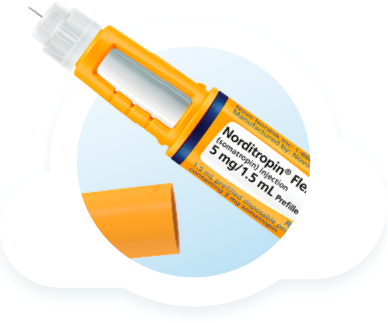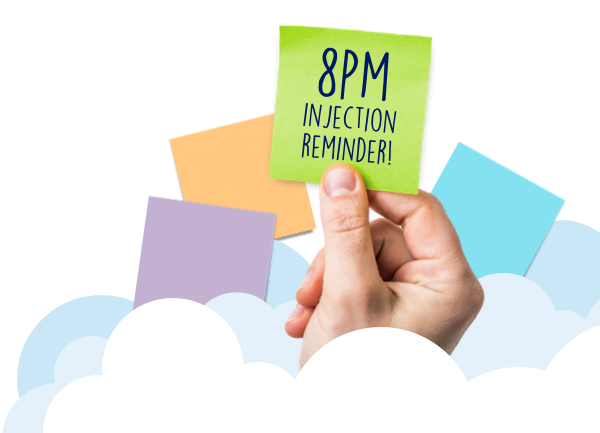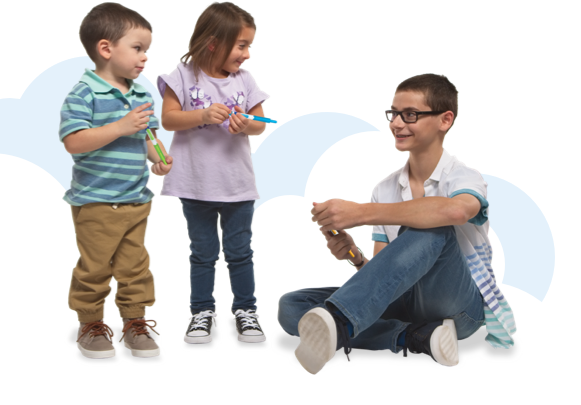Taking Norditropin®
Ready to get started?
Children may be wondering about getting started. These tips about setting up a routine and staying consistent may help.

Actor portrayal

Preparing for injection
Choose a location that is quiet and comfortable and has enough space for the supplies you’ll be using, like alcohol wipes and a sharps container. Try storing supplies together in a dedicated bag or caddy—one that your child can decorate!
Perform the injection when your child is relaxed and mentally prepared. Reading books or singing songs may help. Other tips on this page, like following a routine and offering rewards, can also be helpful.
Setting a routine
Consistent routines are an important part of taking the medication as prescribed by your doctor. To stay consistent, try:
- Setting alarms or reminders so that you inject at the same time each day.
- Checking off each day’s injection on a calendar or checklist after you complete it.
- Include the injection as a part of other routines, like getting home from school or getting ready for bed.

Gigi (right), born SGA

Maintaining motivation
There are lots of ways to keep the process fun and interesting, such as:
- Offering rewards for certain milestones, like completing a full month of injections or outgrowing an item of clothing.
- For the first week of injections, giving your child a new treat or prize with each one.
- Having open and honest conversations when your child is reluctant or resistant.
Traveling with Norditropin®
Taking Norditropin® on the road (or in the air)? Remember to:
- Plan the number of doses you need, so you can pack enough pens.
- If you’re flying, prepare for security with a doctor’s letter and prescription label details.
- Carry the medication with you. Don’t check it with luggage.
- Keep new FlexPro® pens fresh with a cooler and ice packs. Pens you’ve used at least once don’t need to be refrigerated.a
aAll unused Norditropin® products must be refrigerated (36 °F to 46 °F) prior to first use. Do not freeze and avoid direct light. After first injection, Norditropin® pens can either be stored outside of the refrigerator (up to 77 °F) for use within 3 weeks, or in the refrigerator (between 36 °F and 46 °F) for use within 4 weeks.
Actor portrayal

William (left), born with GHD. Gigi (center), born SGA. Izzy (right), born with GHD.

Talking to people about treatment
It’s up to you whom you tell about your child’s treatment and how much detail you provide. You might choose to inform some people, like teachers, coaches, or other caregivers, so they’re aware of possible side effects or can assist with injections.
Some parents go into depth about the diagnosis and what it means. Others keep it short and simple.
Bottom line: This is your child’s story. Tell it in whatever way feels best and most logical to you.
Let’s grow. Let’s go!
Get creative! Decorate your FlexPro®
Help your child add a little fun and flair to their FlexPro® pen with our free charms and stickers.
Growth stories
See what other families have to say about establishing routines, finding support, and other aspects of their personal growth journeys.
Aria, born with GHD
Important Safety Information:
Do not use Norditropin® if:
- you have a critical illness caused by certain types of heart or stomach surgery, trauma or breathing (respiratory) problems
- you are a child with Prader-Willi syndrome who is severely obese or has breathing problems including sleep apnea (briefly stop breathing during sleep)
- you have cancer or other tumors
- you are allergic to somatropin or any of the ingredients in Norditropin®
- your healthcare provider tells you that you have certain types of eye problems caused by diabetes (diabetic retinopathy)
- you are a child with closed bone growth plates (epiphyses)
Before taking Norditropin®, tell your healthcare provider about all of your medical conditions, including if you:
- have had heart or stomach surgery, trauma or serious breathing (respiratory problems)
- have had a history of problems breathing while you sleep (sleep apnea)
- have or have had cancer or any tumor
- have diabetes
- are pregnant or breastfeeding, or plan to become pregnant or breastfeed
Tell your healthcare provider about all the medicines you take, including prescription and over-the-counter medicines, vitamins, and herbal supplements. Norditropin® may affect how other medicines work, and other medicines may affect how Norditropin® works.
How should I use Norditropin®?
- Use Norditropin® exactly as your health care provider tells you to.
- Do not share your Norditropin® pens and needles with another person even if the needle has been changed. You may give another person an infection or get an infection from them.
What are the possible side effects of Norditropin®?
Norditropin® may cause serious side effects, including:
- high risk of death in people who have critical illnesses because of heart or stomach surgery, trauma or serious breathing (respiratory) problems
- high risk of sudden death in children with Prader-Willi syndrome who are severely obese or have breathing problems including sleep apnea
- increased risk of growth of cancer or a tumor that is already present and increased risk of the return of cancer or a tumor in people who were treated with radiation to the brain or head as children and who developed low growth hormone problems. Contact the healthcare provider if you or your child start to have headaches, or have changes in behavior, changes in vision, or changes in moles, birthmarks, or the color of your skin
- new or worsening high blood sugar (hyperglycemia) or diabetes
- increase in pressure in the skull (intracranial hypertension). If you or your child has headaches, eye problems, nausea or vomiting, contact the healthcare provider
- serious allergic reactions. Get medical help right away if you or your child has the following symptoms: swelling of your face, lips, mouth, or tongue, trouble breathing, wheezing, severe itching, skin rashes, redness or swelling, dizziness or fainting, fast heartbeat or pounding in your chest, or sweating
- your body holding too much fluid (fluid retention) such as swelling in the hands and feet, pain in your joints or muscles or nerve problems that cause pain, burning, or tingling in the hands, arms, legs and feet. Tell your healthcare provider if you have any of these signs or symptoms of fluid retention
- decrease in a hormone called cortisol. Tell your or your child’s healthcare provider if you or your child has darkening of the skin, severe fatigue, dizziness, weakness, or weight loss
- decrease in thyroid hormone levels
- hip and knee pain or a limp in children (slipped capital femoral epiphysis). This may lead to a serious condition where bone tissue dies due to a lack of blood supply (osteonecrosis). Get medical help right away if your child develops a limp or has hip or knee pain
- worsening of curvature of the spine (scoliosis)
- severe and constant abdominal pain can be a sign of pancreatitis. Tell your or your child’s healthcare provider if you or your child has any new abdominal pain
- loss of fat and tissue weakness in the area of skin you inject
- increase in phosphorus, alkaline phosphatase, and parathyroid hormone levels in your blood
The most common side effects of Norditropin® include:
- injection site reactions and rashes, and headaches
Please click here for Norditropin® Prescribing Information.
Norditropin® is a prescription medication. You are encouraged to report negative side effects of prescription drugs to the FDA. Visit www.fda.gov/medwatch, or call 1-800-FDA-1088.
What is Norditropin®?
Norditropin® (somatropin) injection 5 mg, 10 mg, 15 mg, or 30 mg is a prescription medicine that contains human growth hormone, the same growth hormone made by the human body.
Norditropin® is given under the skin (subcutaneous) and is used to treat:
- children who are not growing because of low or no growth hormone
- children who are short (in stature) and who have Noonan syndrome, Turner syndrome, or were born small (small for gestational age-SGA) and have not caught-up in growth by age 2 to 4 years
- children who have Idiopathic Short Stature (ISS)
- children who are not growing who have Prader-Willi syndrome (PWS)
- adults who do not make enough growth hormone
What is Norditropin®?
Norditropin® (somatropin) injection 5 mg, 10 mg, 15 mg, or 30 mg is a prescription medicine that contains human growth hormone, the same growth hormone made by the human body.
Norditropin® is given under the skin (subcutaneous) and is used to treat:
- children who are not growing because of low or no growth hormone
- children who are short (in stature) and who have Noonan syndrome, Turner syndrome, or were born small (small for gestational age-SGA) and have not caught-up in growth by age 2 to 4 years
- children who have Idiopathic Short Stature (ISS)
- children who are not growing who have Prader-Willi syndrome (PWS)
- adults who do not make enough growth hormone
Important Safety Information:
Do not use Norditropin® if:
- you have a critical illness caused by certain types of heart or stomach surgery, trauma or breathing (respiratory) problems
- you are a child with Prader-Willi syndrome who is severely obese or has breathing problems including sleep apnea (briefly stop breathing during sleep)
- you have cancer or other tumors
- you are allergic to somatropin or any of the ingredients in Norditropin®
- your healthcare provider tells you that you have certain types of eye problems caused by diabetes (diabetic retinopathy)
- you are a child with closed bone growth plates (epiphyses)
Before taking Norditropin®, tell your healthcare provider about all of your medical conditions, including if you:
- have had heart or stomach surgery, trauma or serious breathing (respiratory problems)
- have had a history of problems breathing while you sleep (sleep apnea)
- have or have had cancer or any tumor
- have diabetes
- are pregnant or breastfeeding, or plan to become pregnant or breastfeed
Tell your healthcare provider about all the medicines you take, including prescription and over-the-counter medicines, vitamins, and herbal supplements. Norditropin® may affect how other medicines work, and other medicines may affect how Norditropin® works.
Important Safety Information:
Do not use Norditropin® if:
- you have a critical illness caused by certain types of heart or stomach surgery, trauma or breathing (respiratory) problems
- you are a child with Prader-Willi syndrome who is severely obese or has breathing problems including sleep apnea (briefly stop breathing during sleep)
- you have cancer or other tumors
- you are allergic to somatropin or any of the ingredients in Norditropin®
- your healthcare provider tells you that you have certain types of eye problems caused by diabetes (diabetic retinopathy)
- you are a child with closed bone growth plates (epiphyses)
Before taking Norditropin®, tell your healthcare provider about all of your medical conditions, including if you:
- have had heart or stomach surgery, trauma or serious breathing (respiratory problems)
- have had a history of problems breathing while you sleep (sleep apnea)
- have or have had cancer or any tumor
- have diabetes
- are pregnant or breastfeeding, or plan to become pregnant or breastfeed
Tell your healthcare provider about all the medicines you take, including prescription and over-the-counter medicines, vitamins, and herbal supplements. Norditropin® may affect how other medicines work, and other medicines may affect how Norditropin® works.
How should I use Norditropin®?
- Use Norditropin® exactly as your health care provider tells you to.
- Do not share your Norditropin® pens and needles with another person even if the needle has been changed. You may give another person an infection or get an infection from them.
What are the possible side effects of Norditropin®?
Norditropin® may cause serious side effects, including:
- high risk of death in people who have critical illnesses because of heart or stomach surgery, trauma or serious breathing (respiratory) problems
- high risk of sudden death in children with Prader-Willi syndrome who are severely obese or have breathing problems including sleep apnea
- increased risk of growth of cancer or a tumor that is already present and increased risk of the return of cancer or a tumor in people who were treated with radiation to the brain or head as children and who developed low growth hormone problems. Contact the healthcare provider if you or your child start to have headaches, or have changes in behavior, changes in vision, or changes in moles, birthmarks, or the color of your skin
- new or worsening high blood sugar (hyperglycemia) or diabetes
- increase in pressure in the skull (intracranial hypertension). If you or your child has headaches, eye problems, nausea or vomiting, contact the healthcare provider
- serious allergic reactions. Get medical help right away if you or your child has the following symptoms: swelling of your face, lips, mouth, or tongue, trouble breathing, wheezing, severe itching, skin rashes, redness or swelling, dizziness or fainting, fast heartbeat or pounding in your chest, or sweating
- your body holding too much fluid (fluid retention) such as swelling in the hands and feet, pain in your joints or muscles or nerve problems that cause pain, burning, or tingling in the hands, arms, legs and feet. Tell your healthcare provider if you have any of these signs or symptoms of fluid retention
- decrease in a hormone called cortisol. Tell your or your child’s healthcare provider if you or your child has darkening of the skin, severe fatigue, dizziness, weakness, or weight loss
- decrease in thyroid hormone levels
- hip and knee pain or a limp in children (slipped capital femoral epiphysis). This may lead to a serious condition where bone tissue dies due to a lack of blood supply (osteonecrosis). Get medical help right away if your child develops a limp or has hip or knee pain
- worsening of curvature of the spine (scoliosis)
- severe and constant abdominal pain can be a sign of pancreatitis. Tell your or your child’s healthcare provider if you or your child has any new abdominal pain
- loss of fat and tissue weakness in the area of skin you inject
- increase in phosphorus, alkaline phosphatase, and parathyroid hormone levels in your blood
The most common side effects of Norditropin® include:
- injection site reactions and rashes, and headaches
Please click here for Norditropin® Prescribing Information.
Norditropin® is a prescription medication. You are encouraged to report negative side effects of prescription drugs to the FDA. Visit www.fda.gov/medwatch, or call 1-800-FDA-1088.
What is Norditropin®?
Norditropin® (somatropin) injection 5 mg, 10 mg, 15 mg, or 30 mg is a prescription medicine that contains human growth hormone, the same growth hormone made by the human body.
Norditropin® is given under the skin (subcutaneous) and is used to treat:
- children who are not growing because of low or no growth hormone
- children who are short (in stature) and who have Noonan syndrome, Turner syndrome, or were born small (small for gestational age-SGA) and have not caught-up in growth by age 2 to 4 years
- children who have Idiopathic Short Stature (ISS)
- children who are not growing who have Prader-Willi syndrome (PWS)
- adults who do not make enough growth hormone
